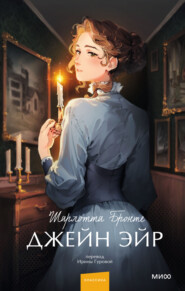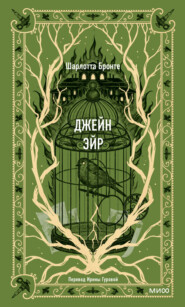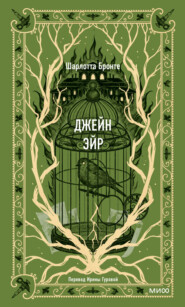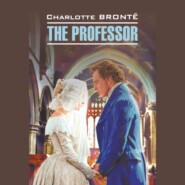По всем вопросам обращайтесь на: info@litportal.ru
(©) 2003-2025.
✖
Jane Eyre
Настройки чтения
Размер шрифта
Высота строк
Поля
“Because you're such a queer, frightened, shy little thing. You should be bolder.”
“What! to get more knocks?”
“Nonsense! But you are rather put upon, that's certain. My mother said, when she came to see me last week, that she would not like a little one of her own to be in your place. – Now, come in, and I've some good news for you.”
“I don't think you have, Bessie.”
“Child! what do you mean? What sorrowful eyes you fix on me! Well, but Missis and the young ladies and Master John are going out to tea this afternoon, and you shall have tea with me. I'll ask cook to bake you a little cake, and then you shall help me to look over your drawers; for I am soon to pack your trunk. Missis intends you to leave Gateshead in a day or two, and you shall choose what toys you like to take with you.”
“Bessie, you must promise not to scold me any more till I go.”
“Well, I will; but mind you are a very good girl, and don't be afraid of me. Don't start when I chance to speak rather sharply; it's so provoking.”
“I don't think I shall ever be afraid of you again, Bessie, because I have got used to you, and I shall soon have another set of people to dread.”
“If you dread them they'll dislike you.”
“As you do, Bessie?”
“I don't dislike you, Miss; I believe I am fonder of you than of all the others.”
“You don't show it.”
“You little sharp thing! you've got quite a new way of talking. What makes you so venturesome and hardy?”
“Why, I shall soon be away from you, and besides” – I was going to say something about what had passed between me and Mrs. Reed, but on second thoughts I considered it better to remain silent on that head.
“And so you're glad to leave me?”
“Not at all, Bessie; indeed, just now I'm rather sorry.”
“Just now! and rather! How coolly my little lady says it! I dare say now if I were to ask you for a kiss you wouldn't give it me: you'd say you'd rather not.”
“I'll kiss you and welcome: bend your head down.” Bessie stooped; we mutually embraced, and I followed her into the house quite comforted. That afternoon lapsed in peace and harmony; and in the evening Bessie told me some of her most enchanting stories, and sang me some of her sweetest songs. Even for me life had its gleams of sunshine.
Chapter V
Five o'clock had hardly struck on the morning of the 19th of January, when Bessie brought a candle into my closet and found me already up and nearly dressed. I had risen half an hour before her entrance, and had washed my face, and put on my clothes by the light of a half-moon just setting, whose rays streamed through the narrow window near my crib. I was to leave Gateshead that day by a coach which passed the lodge gates at six a.m. Bessie was the only person yet risen; she had lit a fire in the nursery, where she now proceeded to make my breakfast. Few children can eat when excited with the thoughts of a journey; nor could I. Bessie, having pressed me in vain to take a few spoonfuls of the boiled milk and bread she had prepared for me, wrapped up some biscuits in a paper and put them into my bag; then she helped me on with my pelisse and bonnet, and wrapping herself in a shawl, she and I left the nursery. As we passed Mrs. Reed's bedroom, she said, “Will you go in and bid Missis good-bye?”
“No, Bessie: she came to my crib last night when you were gone down to supper, and said I need not disturb her in the morning, or my cousins either; and she told me to remember that she had always been my best friend, and to speak of her and be grateful to her accordingly.”
“What did you say, Miss?”
“Nothing: I covered my face with the bedclothes, and turned from her to the wall.”
“That was wrong, Miss Jane.”
“It was quite right, Bessie. Your Missis has not been my friend: she has been my foe.”
“O Miss Jane! don't say so!”
“Good-bye to Gateshead!” cried I, as we passed through the hall and went out at the front door.
The moon was set, and it was very dark; Bessie carried a lantern, whose light glanced on wet steps and gravel road sodden by a recent thaw. Raw and chill was the winter morning: my teeth chattered as I hastened down the drive. There was a light in the porter's lodge: when we reached it, we found the porter's wife just kindling her fire: my trunk, which had been carried down the evening before, stood corded at the door. It wanted but a few minutes of six, and shortly after that hour had struck, the distant roll of wheels announced the coming coach; I went to the door and watched its lamps approach rapidly through the gloom.
“Is she going by herself?” asked the porter's wife.
“Yes.”
“And how far is it?”
“Fifty miles.”
“What a long way! I wonder Mrs. Reed is not afraid to trust her so far alone.”
The coach drew up; there it was at the gates with its four horses and its top laden with passengers: the guard and coachman loudly urged haste; my trunk was hoisted up; I was taken from Bessie's neck, to which I clung with kisses.
“Be sure and take good care of her,” cried she to the guard, as he lifted me into the inside.
“Ay, ay!” was the answer: the door was slapped to, a voice exclaimed “All right,” and on we drove. Thus was I severed from Bessie and Gateshead; thus whirled away to unknown, and, as I then deemed, remote and mysterious regions.
I remember but little of the journey; I only know that the day seemed to me of a preternatural length, and that we appeared to travel over hundreds of miles of road. We passed through several towns, and in one, a very large one, the coach stopped; the horses were taken out, and the passengers alighted to dine. I was carried into an inn, where the guard wanted me to have some dinner; but, as I had no appetite, he left me in an immense room with a fireplace at each end, a chandelier pendent from the ceiling, and a little red gallery high up against the wall filled with musical instruments. Here I walked about for a long time, feeling very strange, and mortally apprehensive of some one coming in and kidnapping me; for I believed in kidnappers, their exploits having frequently figured in Bessie's fireside chronicles. At last the guard returned; once more I was stowed away in the coach, my protector mounted his own seat, sounded his hollow horn, and away we rattled over the “stony street” of L-.
The afternoon came on wet and somewhat misty: as it waned into dusk, I began to feel that we were getting very far indeed from Gateshead: we ceased to pass through towns; the country changed; great grey hills heaved up round the horizon: as twilight deepened, we descended a valley, dark with wood, and long after night had overclouded the prospect, I heard a wild wind rushing amongst trees.
Lulled by the sound, I at last dropped asleep; I had not long slumbered when the sudden cessation of motion awoke me; the coach-door was open, and a person like a servant was standing at it: I saw her face and dress by the light of the lamps.
“Is there a little girl called Jane Eyre here?” she asked. I answered “Yes,” and was then lifted out; my trunk was handed down, and the coach instantly drove away.
I was stiff with long sitting, and bewildered with the noise and motion of the coach: Gathering my faculties, I looked about me. Rain, wind, and darkness filled the air; nevertheless, I dimly discerned a wall before me and a door open in it; through this door I passed with my new guide: she shut and locked it behind her. There was now visible a house or houses – for the building spread far – with many windows, and lights burning in some; we went up a broad pebbly path, splashing wet, and were admitted at a door; then the servant led me through a passage into a room with a fire, where she left me alone.
I stood and warmed my numbed fingers over the blaze, then I looked round; there was no candle, but the uncertain light from the hearth showed, by intervals, papered walls, carpet, curtains, shining mahogany furniture: it was a parlour, not so spacious or splendid as the drawing-room at Gateshead, but comfortable enough. I was puzzling to make out the subject of a picture on the wall, when the door opened, and an individual carrying a light entered; another followed close behind.
The first was a tall lady with dark hair, dark eyes, and a pale and large forehead; her figure was partly enveloped in a shawl, her countenance was grave, her bearing erect.
“The child is very young to be sent alone,” said she, putting her candle down on the table. She considered me attentively for a minute or two, then further added -
“She had better be put to bed soon; she looks tired: are you tired?” she asked, placing her hand on my shoulder.
“A little, ma'am.”
“And hungry too, no doubt: let her have some supper before she goes to bed, Miss Miller. Is this the first time you have left your parents to come to school, my little girl?”
I explained to her that I had no parents. She inquired how long they had been dead: then how old I was, what was my name, whether I could read, write, and sew a little: then she touched my cheek gently with her forefinger, and saying, “She hoped I should be a good child,” dismissed me along with Miss Miller.
The lady I had left might be about twenty-nine; the one who went with me appeared some years younger: the first impressed me by her voice, look, and air. Miss Miller was more ordinary; ruddy in complexion, though of a careworn countenance; hurried in gait and action, like one who had always a multiplicity of tasks on hand: she looked, indeed, what I afterwards found she really was, an under-teacher. Led by her, I passed from compartment to compartment, from passage to passage, of a large and irregular building; till, emerging from the total and somewhat dreary silence pervading that portion of the house we had traversed, we came upon the hum of many voices, and presently entered a wide, long room, with great deal tables, two at each end, on each of which burnt a pair of candles, and seated all round on benches, a congregation of girls of every age, from nine or ten to twenty. Seen by the dim light of the dips, their number to me appeared countless, though not in reality exceeding eighty; they were uniformly dressed in brown stuff frocks of quaint fashion, and long holland pinafores. It was the hour of study; they were engaged in conning over their to-morrow's task, and the hum I had heard was the combined result of their whispered repetitions.
Miss Miller signed to me to sit on a bench near the door, then walking up to the top of the long room she cried out -

















